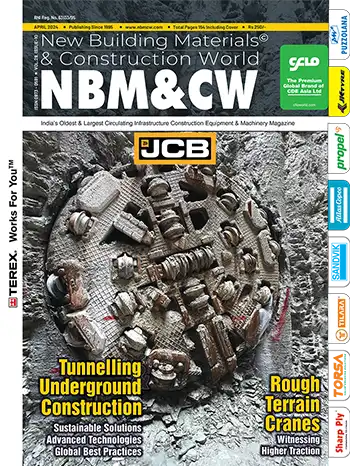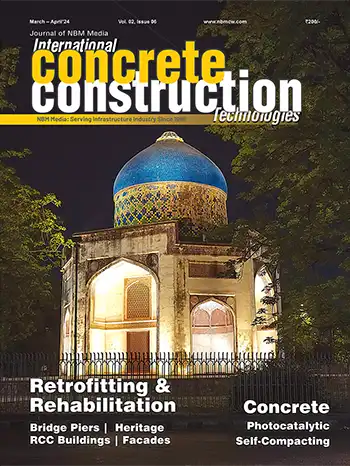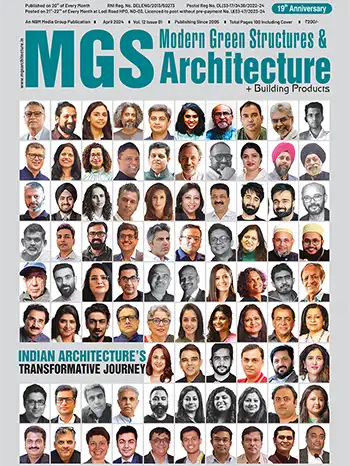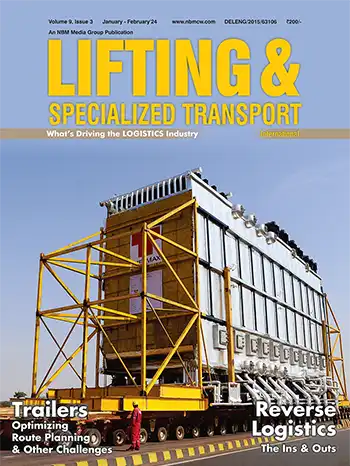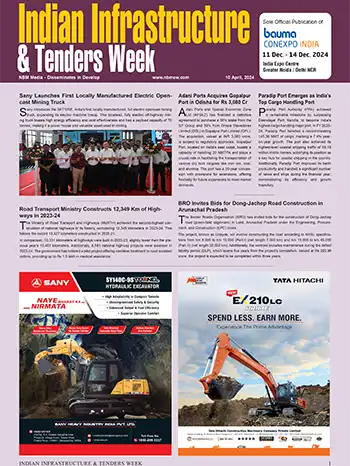Tech-Dry: Focus on 4th Generation Products
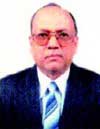
What is Tech-Dry’s overview of development in construction chemicals market in India, its size, its problems and its future prospects? How is the present slowdown in infrastructure going to impact the future development of this sector in India in particular reference to Tech–Dry future plans?
The total construction chemicals market in India, according to different sources, is around Rs.1200–1500 crores per annum. It would be incorrect to say that the present global economy and recession worldwide has not affected our industry but the silver lining paradoxically is that repair, rehabilitation and rejuvenation will never stop. Protecting our structures is a continuous process and will sustain us. I think the present situation will soon be over and the construction industry, namely, the building and manufacturing segments will pick up, and infrastructure more so. In fact, the latter segment seems little affected by the present slowdown, with demand and volumes remain steady.
Waterproofing is an integral part of construction and this fact has not yet been completely appreciated by the industry. For the future development of this sector, there has to be awareness of the damage that this industry is doing to the environment and it is important to vigorously shift to green concrete using non-toxic, water-based materials and adopting techniques that offer durability to the building and light weight concrete. To countermand the use of conventional waterproofing products and often-meaningless performance guarantees of 10-20 years, and given the fact that most of our buildings leak and repairs are frequently required, there is a crying need for professionalism in this segment of the construction industry.
Our company, Tech-Dry has made its mission to promote the products that are environment– friendly (non-hazardous, non-toxic), water-based, energy saving, and which increase the safety and durability of buildings.
Tech-Dry (India) Pvt. Ltd., was established in 1992 in Bangalore and in the same year we established a sister application company Building Protection Systems Pvt. Ltd. (BPS). We have our own production facilities, which are ISO 9001:2000 certified where we offer a range of more than 150 products for waterproofing, restoration, repair and rehabilitation of the complete building envelope. A key strength that we bring to the market is that each product is the outcome of extensive R&D efforts and undergoes field trials for a number of years.
BPS undertakes rectification work and also handles a very large number of new residential and commercial complexes in association with major builders in Bangalore and is still continuing, although at a slower pace.
What are the important business areas of Tech–Dry, its manufacturing facilities and their locations in the country and prominent products back up?
Our thrust is to promote green concrete, protect the environment from global warming, produce water-based nontoxic products and create awareness in the industry about the importance of waterproofing.
Tech-Dry has a wide selection of chemicals that are simple to use and offer unmatched solutions to waterproofing needs. However, correct assessment of the problem, appropriate surface treatment and correct product application are critical to successful waterproofing. Alongside product innovation, with over 16 years behind us, we have developed standard methodologies for treatment of many common waterproofing issues that affect terraces, podium slabs, bathrooms, swimming pools, expansion joints, basement floors, retaining walls, and external surfaces like sumps, sewerage, below ground pools and sloped roofs.
Tech-Dry has its production facilities in Bangalore with highly skilled personnel and it is backed by strong research activity. Tech-Dry produces mainly water-based and environment–friendly products. We also believe that the solution should be long-term rather than immediate repairs. Accordingly, our research and development centre has developed products for defect removal, repairs and waterproofing.
How over the years, the company has evolved itself to be the specialist in developing new generation construction chemical products catering to the varied needs of civil engineering and construction?
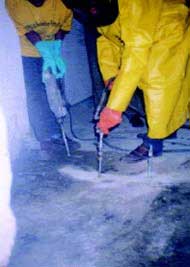
The science of waterproofing unfortunately depends on a restricted, rather naive belief that a thick coating on the surface will stop water seepage. Even this thick coating is laid without any logic, on account of the difficulty in locating the water entry points.
Traditionally, the construction chemicals market offers sealers, admixtures, etc. Conventional chemicals have not been very successful and the priority of manufacturers, including Tech-Dry, has changed to launching new high-performance construction chemical products ranging from new color options to tough sealants able to withstand extreme weather conditions to caulks with anti-microbial additives that will fight mold and mildew. These products are being developed not only with the professional contractor in mind but also the average homeowner who now demands more from these products.
The use of techniques like nano-technology have been adopted by Tech-Dry and important areas like flat roofing, expansion joint, light weight concrete, thermal insulation, impregnants, micro emulsion etc. have been developed. The major contribution of the company has been to develop new techniques in the field of grouting, like 2-component injection. The company has stayed away from me-too products like coatings and has developed a series of Elastomeric Coatings which, unlike conventional membranes that have several problems, are breathable, flexible membranes, with high elongation, weather ability and crack bridging properties. We also specialize in products that are not produced by others, like effective products for roofing, expansion joints, thermal insulation, defect removal and other requirements of the building envelope.
The resilience and large strain capacity of elastomers can be exploited to absorb blast energy and contain building debris. Elastomers are composed of long polymer chains, usually cross-linked or connected by chemical bonds. Cross-linking makes elastomers reversibly stretchable within a significant range of deformations. In the unstretched state, the polymer chains are oriented in random directions. When stretched, the polymer chains become elongated and ordered along the deformation direction. When no longer stretched, the cross-links guide the elastomer back to its original shape as the chains once again randomize.
Product customization is becoming the main driver in product development strategy. How is Tech–Dry dovetailing its technical and R&D prowess to develop new products synthesizedwith inputs from its customers, technical collaborators and its entrenched efficient sales force and dealeship network? What are the focused areas of Tech-Dry’s R&D supporting company’s product development initiatives?
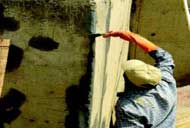
When we entered into this business in 1992, the level of consciousness on benefits of waterproofing was not wide spread. This situation and the very high cost of imported chemicals left the building market to be served by unorganized sectors. Research and Innovation is the long-term business objective of Tech-Dry. All Tech-Dry products are technologically advanced products that have a clear advantage in the market place, namely, a large selection of water-based, waterproofing and building rehabilitation products. These are novel 4th generation products that are the result of years of scientific research and development.
Tech-Dry offers a wide selection of waterproofing chemicals that are simple to use and offer unmatched solutions to waterproofing needs. However, alongside product innovation, accurate assessment of the problem, appropriate surface treatment and correct product application are critical to successful waterproofing. Tech-Dry has given great importance to preparation of surface and creating methodologies to handle problems.
With over 16 years behind it, Tech-Dry has developed and standardized almost the complete building envelope, both below and above grade, covering segments such as methodologies for the treatment of many common waterproofing issues that affect areas such as terraces, podium slabs, bathrooms, swimming pools, expansion joints, basement floors and retaining walls, treatment of external surfaces, sump, sewerage, below ground pools, and sloped roofs.
Developing products and proper solutions for troubleshooting project depends upon the expertise of user and applicators. What are various systems placed in the company to train applicators and related technical services provided by Tech–Dry’s application company, Building Protection System (BPS)?
Tech-Dry has operated by following a distinct marketing strategy. Typically, its product distribution channel is a network of applicators and distributors in various parts of India to market and/or apply its products. These applicators/distributors normally undertake the work in their own territory and Tech-Dry provides immediate technical back up and prompt customer advice and service. This marketing strategy has proven to be successful over the past few years.
In addition to BPS, which is Tech-Dry’s application arm and big support, Tech-Dry has about 60 applicators in towns and metropolitan cities like Chennai, Delhi, Kolkata, Lucknow, Kochi, Hyderabad, Mumbai, Jaipur, Pune, Goa, Nagpur, Bangalore, and other parts of Karnataka.
Tech-Dry also encourages growth in public awareness of the importance of waterproofing in construction and organizes conferences, publishes scientific papers on its research, offers technical seminars and media releases through its professional networks. In this way, Tech-Dry concentrates its core business in R&D, resulting in technologically advanced products aimed at the niche market rather than ordinary products which usually require mass advertising, severe price competition and broad market distributorship.
Is it possible to elaborate on one or two success stories of application of Tech-Dry products on important projects undertaken that have contributed towards fulfillment of customer needs and expectations and justifying Company’s mission statement, saving environment, energy and imparting safety and durability of buildings.
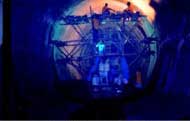
During 1992-93, one of our first jobs handled, Leakage through roof spanning a vast area; seepage in bathrooms, Chapel and other rooms, due to structural defect. Problem particularly serious during the rainy season. Hope of solving the problem was given up and one suggestion was to demolish part of the building. Tech-Dry convinced the Rector to entrust us with one wing. After successfully weathering one monsoon, we were given the other two wings, the Chapel and other areas. The leakage was reduced to less than 1%, exceeding all expectations.
Prestige Meridian, Mahatma Gandhi Road, Bangalore, prestigious office and commercial complex
Large water tank above 13th Floor; impressive sloping roof, architecturally designed. Serious water seepage from flat bottom into the office of Cambridge Technology Partners, below. Not feasible to treat problem from inside the tank - difficult area for workers to operate in, moreover, shutting down water supply would cause hardship to the building occupants. Problem solved ingeniously by Tech-Dry chemically injecting two components and Protekta Grip through the ceiling of the Cambridge Technology office into the base of the water tank. A second water tank was treated, with equal success. The basement leakage was also entrusted to us, and thereafter several ongoing projects of the Prestige Group.
The Raman Research Institute, Bangalore
1994. The lady Director of this prestigious Institute, founded by Nobel Laureate Sir C.V. Raman, contacted us and explained that several attempts at waterproofing had failed. She was particularly concerned as her house had just been “waterproofed” and painted, but the seepage had begun again. On inspection, we found the roof was loaded with several coatings of so-called waterproofing material, including asphalt/bitumen. We were advised to leave these untouched since the building was very old. We expressed our apprehensions of succeeding if this was to be the case, till she finally agreed to allow us to work our way, provided we could assure them of 80% success. We did the work successfully and were given the waterproofing of other buildings in the Institute as well as Sir C.V. Raman’s house in Malleswaram.
NBMCW March 2009














